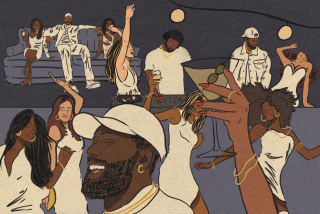Chapman Sermon Examines Racism, Sexism in Rock
- Share via
ORANGE — The sounds coming from the old, wooden Chapman College Chapel in this Disneyland-quaint section of Old Towne may have jolted a few casual passers-by.
There was the Guns N’ Roses song “One in a Million,” with lead singer Axl Rose spitting out his now-infamous epithets directed at blacks, gays and immigrants, and the current rap hit “Bust a Move” by Young M.C., replete with a shot of pure misogyny in one of its middle verses.
The tunes were blasting from the boom box of Paul Frizler, who took the pulpit during Sunday’s morning service to deliver a sermon on “Racism and Sexism in Rock ‘n’ Roll Music: Censorship or Freedom?”
Frizler, head of Chapman College’s English department, directed the school’s popular impersonation revues recapping 25 years and 30 years of rock ‘n’ roll history. He’s now at work auditioning and rehearsing the next edition, “35 Years of Rock ‘n’ Roll,” due next February.
A rock fan from the earliest days--he remembers driving into central Los Angeles as a teen in the pre-Elvis ‘50s to find scarce rhythm-and-blues records--Frizler admitted to an audience of about 20 that he doesn’t keep up with music as he once did. So with each new edition of the revue, he gives himself a crash course in the newest pop trends.
That was a welcome task in 1984, he said, when rock was in the midst of rediscovering a social consciousness with such songs as “We Are the World” and benefit concert events such as Live Aid. But Frizler said he undertook his research this time around with trepidation, brought on by a sense that today’s music scene reflects an atmosphere of “racism, hate and violence.”
As examples, he singled out Guns N’ Roses and especially the song “One in a Million,” which has been a source of continuing controversy, and the rap group Public Enemy, whom he described as “extremely talented” but whose music, he said, is marred by an “undertone of violence and racism”--this time against whites.
He played a snippet of Young M.C.’s “Bust a Move,” commenting that the isolated verse “basically says that all women are materialistic bitches.” He is struggling with whether to include the song in the revue, he said: “It’s probably the best rap song I’ve heard . . . and yet, this is an insidious message.”
Frizler stressed that he has long been against any form of censorship (he specializes in the books of James Joyce, a censorship victim) and said he has never had a problem with sexual suggestiveness in song lyrics. But, he said, the message in some current music tested his self-proclaimed stance as a civil libertarian, and he found himself asking, “Should these horribly offensive works be censored?”
He finally decided, he said Sunday, that to suppress the works would be “more dangerous” than letting them see the light of day. Songs with “offensive” lyrics, Frizler said, have their roots in what is happening in society at large. “All art, high art or low art, reflects culture,” he concluded.
“Maybe, actually, this is a good thing,” he added, because the public debate over rock lyrics forces society to confront larger issues of racism and sexism.
Frizler opted to conclude his informal talk on a positive note, playing all of Tracy Chapman’s “Talkin’ ‘bout a Revolution”, with its message of struggle against a litany of social ills, for the assembled parishioners, most of them students. “We end today with Tracy Chapman,” Frizler said, “to show that social consciousness is not dead in rock.”
More to Read
The biggest entertainment stories
Get our big stories about Hollywood, film, television, music, arts, culture and more right in your inbox as soon as they publish.
You may occasionally receive promotional content from the Los Angeles Times.










